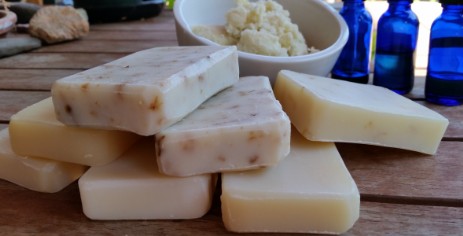Why use natural body care products?
Information
The fats and oils used are from vegetable and animal sources. Vegetable oils like Olive, Palm & Coconut are used and animal fats known as tallow (fat from cattle & sheep) and lard (pork) may also be used. We use only vegetable oils and butters to make our soaps.

Why use natural soap? The most common reason people use natural soap is because it’s gentle to the skin and makes it feel soft, unlike commercial soap which leaves skin feeling tight and dry. Commercial soaps are made with the same detergents used in dish soaps and floor cleaners. Manufacturers have to add all kinds of synthetic skin conditioners to make up for the fact that the harsh detergents are very drying to the skin. For example, Dove – yes the beloved Dove. The first ingredient, meaning it’s the predominant one, is Sodium Lauroyl Isethionate, a synthetic detergent.
Another reason to use natural soap is avoiding synthetic fragrance oils also known as aroma chemicals, which are recognized by the FDA as “common contact allergens”. Many people are sensitive to these chemicals and experience headaches, dizziness, rashes & other skin irritations, even nausea, never suspecting that their soap may be the culprit. Our soap is made with only pure essential oils.
And it’s not just for people with sensitive skin or allergies. More and more people are becoming aware of what’s in their soap and feel good knowing that it’s made with natural vegetable oils not chemicals. They’re beginning to realize how constantly bombarding our bodies with these various chemicals stresses our immune system. It becomes overwhelmed by all of these chemical “invaders” and having to deal with them unnecessarily, rather than being able to focus on actual invaders like viruses and bacteria.
Another reason to use natural soap is avoiding synthetic fragrance oils also known as aroma chemicals, which are recognized by the FDA as “common contact allergens”. Many people are sensitive to these chemicals and experience headaches, dizziness, rashes & other skin irritations, even nausea, never suspecting that their soap may be the culprit. Our soap is made with only pure essential oils.
And it’s not just for people with sensitive skin or allergies. More and more people are becoming aware of what’s in their soap and feel good knowing that it’s made with natural vegetable oils not chemicals. They’re beginning to realize how constantly bombarding our bodies with these various chemicals stresses our immune system. It becomes overwhelmed by all of these chemical “invaders” and having to deal with them unnecessarily, rather than being able to focus on actual invaders like viruses and bacteria.
Why use natural body care products?
Did you know that our skin absorbs up to 60% of substances applied topically, such as soaps and body care products. This process is called transdermal penetration and the extent of absorption depends on molecular size, the particular substance, and the condition of the skin at the time of contact. Hard to believe? Think products such as nicotine, birth control hormones and nitroglycerin patches.
Every day we use soap, body scrubs and washes, lotions, facial cleansers and toners, deodorants, sunscreens, and toothpastes just to name a few. Women use an average of 12 body care products daily and men use about 7. So it’s important to know what we are putting on our skin.
Did you know that our skin absorbs up to 60% of substances applied topically, such as soaps and body care products. This process is called transdermal penetration and the extent of absorption depends on molecular size, the particular substance, and the condition of the skin at the time of contact. Hard to believe? Think products such as nicotine, birth control hormones and nitroglycerin patches.
Every day we use soap, body scrubs and washes, lotions, facial cleansers and toners, deodorants, sunscreens, and toothpastes just to name a few. Women use an average of 12 body care products daily and men use about 7. So it’s important to know what we are putting on our skin.
It is equally important to understand how our skin functions in order to realize the impact that body care products can have on our health and well being.
Our skin is the largest organ of our body and has nine essential functions:
1. Protects our bodies from physical, chemical and thermal damage; also plays a key role in our immunity by guarding against pathogens.
2. Regulates body temperature.
3. Absorbs UV rays and converts them into vitamin D3 which helps maintain strong bones by enhancing the absorption of Calcium and other minerals.
4. Prevents excessive loss of minerals.
5. Regulates moisture by preventing excessive absorption and evaporation of water.
6. Serves as a sensory organ by responding to heat, cold, touch, pain and pressure.
7. Metabolizes and stores fat.
8. Helps excrete salts, urea, water and toxins through sweating.
9. Secretes sebum, our body’s own lubricating substance.

Many commercial body care products contain mineral oil (petrolatum) and other harsh chemicals that can be irritating and sensitizing. Our skin is alive and breathes, absorbs and excretes and using products that contain mineral oil or petrolatum can interfere with that natural process. Parabens, synthetic fragrances and colorants are some of the other common chemicals found in commercial products that can be potentially harmful.
Parabens, used to inhibit microbial growth and extend the shelf life of products (a.k.a. preservatives) have caused many allergic reactions and skin rashes. Found in almost all body care products even though they are known to be toxic.
Synthetic fragrances – products containing these are problematic because manufacturers are allowed (by the FDA) to list these as “fragrance”. They do not have to list all of the actual components making up the fragrance – therefore we have no way of knowing what is actually in the product. Some problems caused by these chemicals are headaches, dizziness, rash, coughing, skin irritation and nausea.
Synthetic colorants, used to make cosmetics “pretty” are made from coal tar. These artificial colorings can cause skin sensitivity and may be carcinogenic. These are labeled as FD&C or D&C followed by a color and a number.
Some other ingredients to avoid: Sodium lauryl sulfate (SLS) and Sodium/laureth sulfate, Diethanolamine (DEA) and Triethanolamine (TEA), Diazolidinyl urea & Imidazolidinyl urea, Propylene Glycol also PEG (polyethylene glycol) and PPG (polypropylene glycol), Phthalates and Petrochemicals. Many of the ingredients listed here cause allergic reactions, headaches, asthmatic complications, skin irritations, skin and hair dryness, and eye irritations.
Using natural body care products is a way to help limit our exposure to everyday toxins or at least ones within our control. We are often exposed to toxins that are more difficult to avoid, many found in our homes and workplaces. Some common culprits are found in carpeting, perfumes and colognes, laundry detergents, air fresheners, and commercial and household cleaning products. Many people who have sensitivities to these toxins and those found in body care products, may never have a full blown allergic reaction like hives for example, but they may have symptoms like frequent headaches, runny nose, skin conditions such as eczema, anxiety and irritability, never realizing the source of the problem.
Parabens, used to inhibit microbial growth and extend the shelf life of products (a.k.a. preservatives) have caused many allergic reactions and skin rashes. Found in almost all body care products even though they are known to be toxic.
Synthetic fragrances – products containing these are problematic because manufacturers are allowed (by the FDA) to list these as “fragrance”. They do not have to list all of the actual components making up the fragrance – therefore we have no way of knowing what is actually in the product. Some problems caused by these chemicals are headaches, dizziness, rash, coughing, skin irritation and nausea.
Synthetic colorants, used to make cosmetics “pretty” are made from coal tar. These artificial colorings can cause skin sensitivity and may be carcinogenic. These are labeled as FD&C or D&C followed by a color and a number.
Some other ingredients to avoid: Sodium lauryl sulfate (SLS) and Sodium/laureth sulfate, Diethanolamine (DEA) and Triethanolamine (TEA), Diazolidinyl urea & Imidazolidinyl urea, Propylene Glycol also PEG (polyethylene glycol) and PPG (polypropylene glycol), Phthalates and Petrochemicals. Many of the ingredients listed here cause allergic reactions, headaches, asthmatic complications, skin irritations, skin and hair dryness, and eye irritations.
Using natural body care products is a way to help limit our exposure to everyday toxins or at least ones within our control. We are often exposed to toxins that are more difficult to avoid, many found in our homes and workplaces. Some common culprits are found in carpeting, perfumes and colognes, laundry detergents, air fresheners, and commercial and household cleaning products. Many people who have sensitivities to these toxins and those found in body care products, may never have a full blown allergic reaction like hives for example, but they may have symptoms like frequent headaches, runny nose, skin conditions such as eczema, anxiety and irritability, never realizing the source of the problem.

